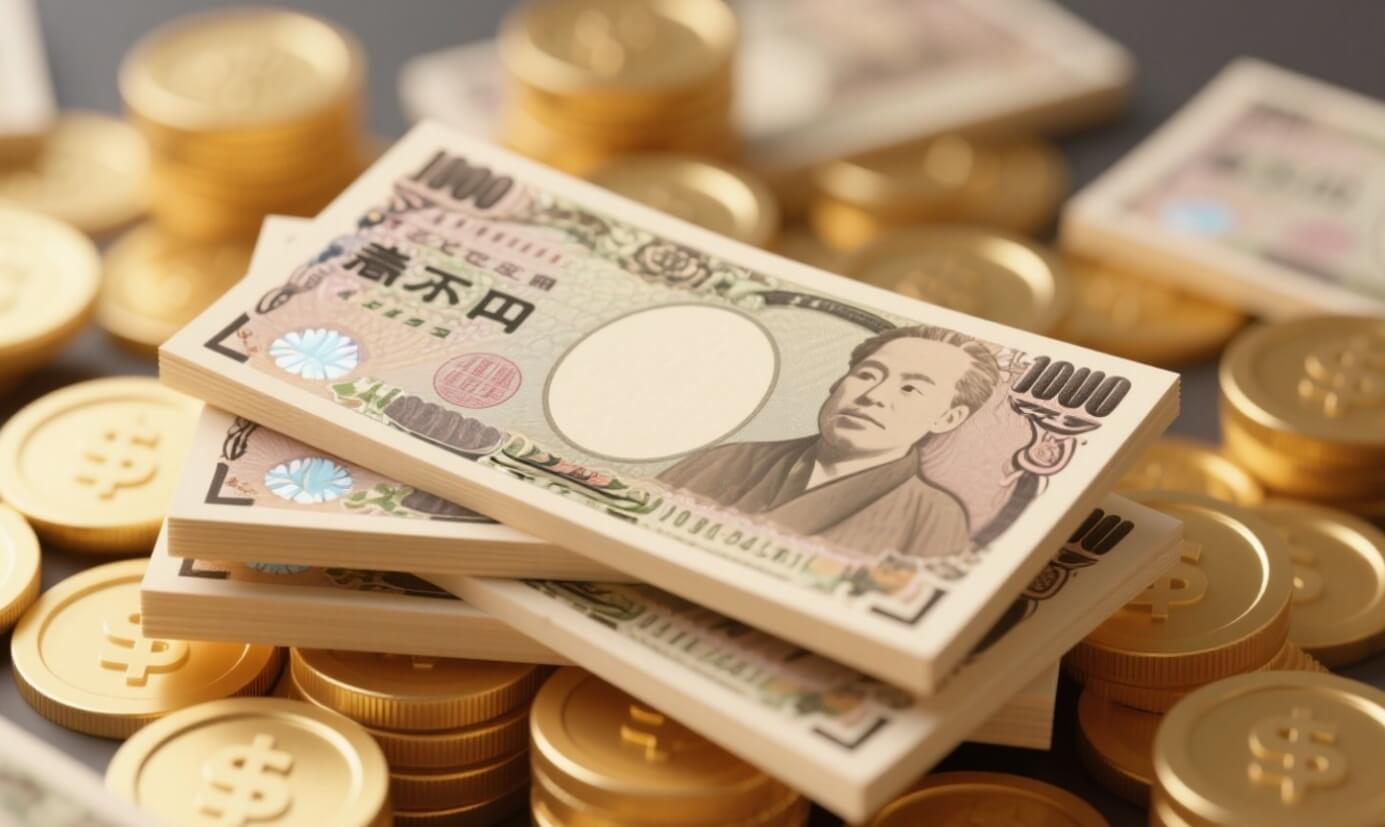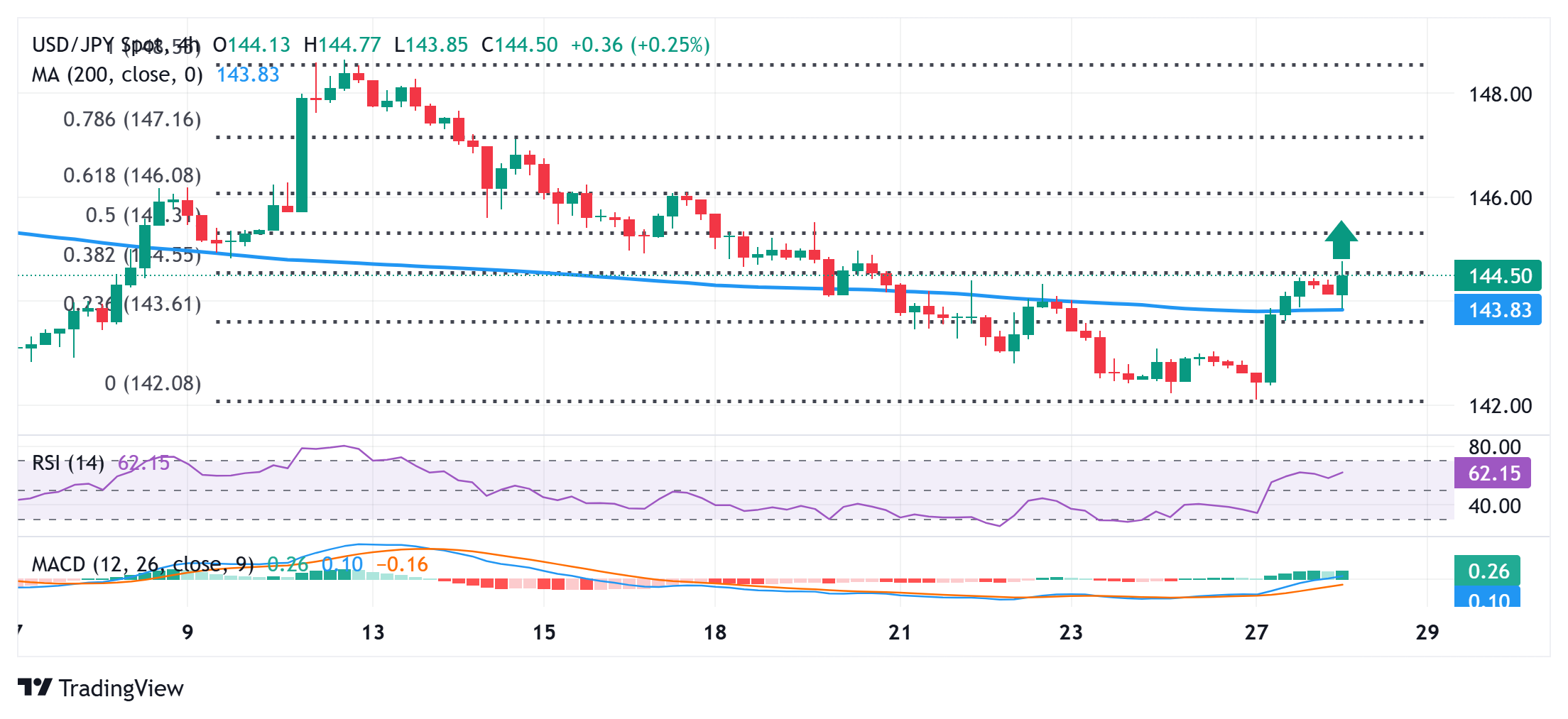
The Japanese Yen attracts some intraday sellers on Wednesday, though it lacks follow-through.
Reports that Japan will take action to curb a rise in JGBs undermine the JPY amid the risk-on mood.
A modest USD uptick supports USD/JPY, though the divergent BoJ-Fed outlook might cap gains.
The Japanese Yen (JPY) slides to a one-week low against its American counterpart during the Asian session on Wednesday, though the intraday downtick lacks follow-through. Comments from Japan's Finance Minister Katsunobu Katō suggested that the government will take some action to curb the recent sharp rise in Japanese Government Bond (JGB) yields. This, along with a generally positive risk tone, undermines the safe-haven JPY and acts as a tailwind for the USD/JPY pair amid some follow-through US Dollar (USD) buying for the second straight day.
The JPY bears, however, refrain from placing aggressive bets amid bets that the Bank of Japan (BoJ) will raise interest rates again. This marks a big divergence in comparison to expectations that the Federal Reserve (Fed) will lower borrowing costs further in 2025, which should limit losses for the lower-yielding JPY. Moreover, the uncertainty over US President Donald Trump’s tariff policies and geopolitical risks should underpin the safe-haven JPY. Apart from this, the underlying USD bearish sentiment might cap further gains for the USD/JPY pair.
Japanese Yen traders seem non-committed amid a combination of diverging forces
Japan’s Finance Minister Shunichi Kato said this Wednesday that the government is concerned about the recent spike in yields and will closely monitor bond market situations. This comes after Reuters reported on Tuesday that Japan's Ministry of Finance will consider tweaking the composition of its bond program for the current fiscal year, which could involve cuts to its super-long bond issuance.
Meanwhile, Bank of Japan Governor Kazuo Ueda said that the outlook remains uncertain as tariff negotiations between the US and Japan are still ongoing. Ueda added that swings in short-term, and medium-term interest rates have bigger impacts on economic activities and that the central bank will closely monitor the bond market. This, along with the latest trade optimism, undermines the Japanese Yen.
US President Donald Trump announced an extension of the deadline for imposing 50% tariffs on European Union imports until July 9, providing a strong boost to the global risk sentiment. This is seen as another factor undermining demand for the safe-haven JPY, though the uncertainty around Trump’s trade policies remains. This, along with hawkish BoJ expectations, helps limit deeper JPY losses.
BoJ officials recently showed a willingness to hike interest rates again if the economy and prices improve as projected. Adding to this, the incoming data pointed to a broadening inflation in Japan and backs the case for further policy tightening by the central bank. Investors, however, now seem convinced that BoJ policymakers will assess tariffs and trade flows before making the next policy move.
In contrast, traders have been pricing in the possibility of at least two 25 basis point rate cuts by the Federal Reserve in 2025 amid signs of easing inflationary pressure in the US. Moreover, concerns that the US budget deficit could worsen at a faster pace than previously expected on the back of US President Donald Trump's dubbed “Big, Beautiful Bill” act as a headwind for the US Dollar.
Russia has refused to engage in ceasefire talks and its forces have made gains in Ukraine's northeast after the deadliest drone and missile attacks since the full-scale invasion in February 2022. Meanwhile, Hamas reportedly agreed to the US ceasefire proposal for Gaza, though a US official said the deal being discussed was “unacceptable” and “disappointing”. This keeps geopolitical risks in play.
Investors now look forward to the release of FOMC meeting minutes for cues about the future rate-cut path, which will play a key role in influencing the USD price dynamics and provide some impetus to the USD/JPY pair. The focus will then turn to the Prelim US Q1 GDP on Thursday, followed by the Tokyo CPI print and the US Personal Consumption Expenditure (PCE) Price Index on Friday.
USD/JPY bulls now await a sustained move beyond the 38.2% Fibo. retracement level

The overnight breakout above the 143.65-143.75 confluence hurdle – comprising the 200-period Simple Moving Average (SMA) on the 4-hour chart and the 23.6% Fibonacci retracement level of the recent downfall from the monthly peak – could be seen as a key trigger for the USD/JPY bulls. Moreover, positive oscillators on the said chart support prospects for a further intraday appreciating move. However, a lack of follow-through beyond the 38.2% Fibo. retracement level and the fact that technical indicators on the daily chart are yet to confirm the constructive outlook warrant caution. Hence, any subsequent move up is likely to face stiff resistance and remain capped near the 145.00 psychological mark. This is followed by the 50% retracement level, around the 145.40 region, which if cleared should pave the way for additional gains.
On the flip side, the 144.00 mark, followed by the 143.75-143.65 confluence resistance breakpoint, could offer some support to the USD/JPY pair. A convincing break below the latter will suggest that the corrective bounce has run out of steam and drag spot prices back to the 143.00 round figure. Some follow-through selling might expose the overnight swing low, around the 142.10 area, or the monthly trough.
* The content presented above, whether from a third party or not, is considered as general advice only. This article should not be construed as containing investment advice, investment recommendations, an offer of or solicitation for any transactions in financial instruments.


